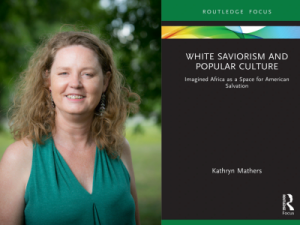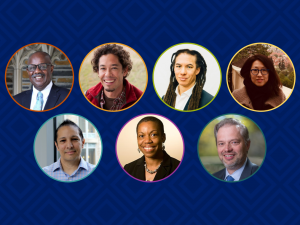Selected as this year’s Duke Chapel Student Preacher, first-year student Erin Dickerson will deliver a sermon in the chapel worship service at 11 a.m. on Sunday, March 5. A double major in Turkish and International Comparative Studies, Dickerson’s sermon, titled “Resting in the Lord,” is based on the Bible’s Psalm 121. “Psalm 121 is about finding rest in God, and God protecting us,” said Dickerson, who is a member of the Duke Wesley campus ministry and also attends the Summit Church in Durham. “It can be tempting to find… read more about Duke Chapel Student Preacher Sermon March 5 to Focus on Rest in God »
“This book is going to get me in trouble,” Kathryn Mathers says. It’s not because the associate professor of the practice of International Comparative Studies and Cultural Anthropology is looking for it. In fact, she thought long and hard about whether she had a right to tackle the subjects she analyzes in the book in question, “White Saviorism and Popular Culture: Imagined Africa as a Space for American Salvation.” Ultimately she decided it was worth the risk, because the book was born from the questions her students kept… read more about Kathryn Mathers’ New Book Debunks Common Myths About Duke Students’ Work in Africa »
North Carolina’s first known mosque was established in Durham nearly 65 years ago, and a current exhibit honors the rich, living history of African American Muslims in the city. “The Transformational History of Ar-Razzaq Islamic Center in Durham” will be on view through December 12, 2022, in the Jerry and Bruce Chappell Family Gallery at the Perkins Library. The thoughtfully curated and thought-provoking exhibition explores five facets of thriving Muslim life in Durham: culture, business, education, civic engagement and… read more about Celebrating North Carolina’s First Mosque and Durham’s Muslim Community »
In her new book, "Made-Up Asians: Yellowface During the Exclusion Era," Esther Kim Lee traces the history of yellowface from 1862 to 1940 — a time when Asians faced legal and cultural exclusion from immigration and citizenship in the United States. We sat down with the professor of Theater Studies, International Comparative Studies and History and director of the Asian American Diaspora Studies Program to talk about the book, why Hollywood producers would go to such lengths to avoid hiring East Asian actors and… read more about Esther Kim Lee Explains How Today’s Racism Has Roots in Last Century’s Yellowface »
Six members of Duke’s Class of 2023 have been named to the second class of Nakayama Scholars. The Nakayama Public Service Scholarship is part of the university’s efforts to encourage students to use their Duke experience to engage with the large challenges facing communities around the world. The students represent multiple disciplines across Duke’s academic departments as well as a variety of future careers. Juniors Alexandra Bennion, Bentley Choi, Garrett Goodman, Shreyas Hallur, Andrew Liu and Nellie Sun were… read more about Duke Names Second Class of Nakayama Scholars »
Mother in the Mist (2021) Special Screening + Q&A with Writer-Director, Kay Niuyue Zhang (ICS Alumna) Friday, April 08, 2022 3:00 pm - 4:30 pm, Pink Parlor, East Duke Building Kay Niuyue Zhang SPONSOR(S): International Comparative Studies (ICS) Following Wuhan's Coronavirus lockdown, a rural single mother, Zhao, embarks on a dangerous journey in search of her preemie newborn baby stranded in Wuhan City Hospital. Joining her path is a mysterious eight-year-… read more about Duke International Comparative Studies (ICS) April Events »
When Michaeline Crichlow moved from her native St. Lucia to upstate New York, she had a lot to learn — and not just in the graduate program she attended at Binghamton University. “I became a Black person not in the Caribbean, but in the United States,” said the professor and interim chair of African & African American Studies. Race wasn’t often discussed in St. Lucia, where the vast majority of the population is Black. The rare times it was, the conversation wasn’t about Black and white, but the Indo-Caribbean peoples… read more about What Decolonization Means »
Even before Adam Rosenblatt joined the faculty at Duke in 2018, he knew about Geer Cemetery. When he came to Durham to interview for a position as associate professor of the practice in International Comparative Studies, one of Rosenblatt’s first stops was the burial ground. Robin Kirk, co-chair for the Duke Human Rights Center at the Franklin Humanities Institute, picked him up and both visited the cemetery for the first time. As a researcher involved with community efforts at other cemeteries, Rosenblatt learned about… read more about Reclaiming and Restoring a Black Burial Ground in Durham »
Senior year for Duke’s Class of 2020 did not go as expected. As they look toward their long-delayed, eagerly anticipated, in-person commencement ceremony on Sept. 26, members of the Class of 2020 share their memories of Duke and how they learned to cherish ordinary moments of connection and community. Katie Cassedy Katie graduated in 2020 with an economics major and a minor in visual media studies. She is currently a UK Agency Associate in LinkedIn’s Business Leadership… read more about The Class of 2020 Remembers Duke »
Four visiting humanities scholars from historically Black colleges and universities and liberal-arts institutions arrived at Duke this August to collaborate with Duke students, faculty and staff. Their projects will cover commemoration practices, early Christian manuscripts, a 17th century Mexican philosopher and the ephemeral nature of digital projects. The fellows are part of Humanities Unbounded, an Andrew W. Mellon Foundation-funded initiative designed to nurture collaboration and inventive expressions of the… read more about Duke Welcomes New Cohort of Visiting Humanities Scholars from HBCUs and Liberal-Arts Schools »
Four visiting humanities scholars from historically Black colleges and universities and liberal-arts institutions arrived at Duke this August to collaborate with Duke students, faculty and staff. Their projects will cover commemoration practices, early Christian manuscripts, a 17th century Mexican philosopher and the ephemeral nature of digital projects. The fellows are part of Humanities Unbounded, an Andrew W. Mellon Foundation-funded initiative designed to nurture collaboration and inventive expressions of the… read more about Duke Welcomes New Cohort of Visiting Humanities Scholars from HBCUs and Liberal-Arts Schools »
When he was an undergraduate political science student, Kerry Haynie was never taught about the 1921 Tulsa massacre. Nor was there much discussion about the role of race in the founding political documents of this country or much examination of how race influenced public services such as sewer lines and zoning.In one sense, a lot has changed. In 2021, Duke’s faculty includes a strong lineup of leading scholars who examine how race is embedded in issues that cross all the schools of the university. This fall, many of these… read more about University Course Raises Race as a Central Element of Undergraduate Education »
When he was an undergraduate political science student, Kerry Haynie was never taught about the 1921 Tulsa massacre. Nor was there much discussion about the role of race in the founding political documents of this country or much examination of how race influenced public services such as sewer lines and zoning. In one sense, a lot has changed. In 2021, Duke’s faculty includes a strong lineup of leading scholars who examine how race is embedded in issues that cross all the schools of the university. This fall, many of… read more about University Course Raises Race as a Central Element of Undergraduate Education »






























